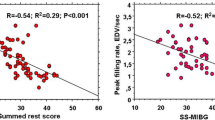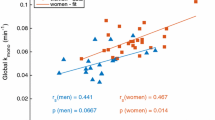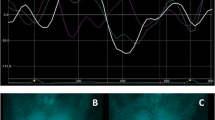Abstract
Little is known about the effects of altered sympathetic innervation on the efficiency of the cardiomyopathic heart. Thus, it was the aim of this study to determine non-invasively the relationship between the metabolic cost of cardiac work and alterations of the sympathetic nervous system. In ten patients with chronic idiopathic dilated cardiomyopathy, left ventricular function and geometry were assessed by tomographic radionuclide angiography. Myocardial oxidative metabolism was quantified by the clearance constant k(mono) for carbon-11 acetate, determined by positron emission tomography (PET). Cardiac efficiency was then estimated by the work-metabolic index [WMI = stroke volume index × heart rate × systolic pressure/k(mono)]. Additionally, myocardial presynaptic sympathetic innervation was investigated in the same PET session using 11C-hydroxyephedrine, and plasma norepinephrine levels were determined by high-performance liquid chromatography. The WMI was 3.0±1.3 mmHg × ml × 106/m2 and correlated significantly with left ventricular ejection fraction (19%±10%; r=0.66, P<0.04) and peripheral vascular resistance (3,638±1,085 dynes × s/cm5; r=–0.75, P<0.01). Cardiac hydroxyephedrine retention, reflecting integrity of presynaptic innervation, was abnormally low in 58%±38% of the left ventricle. Cardiac hydroxyephedrine retention (r=0.65, P<0.05) and plasma norepinephrine concentration (r=–0.80, P<0.01) both correlated significantly with the WMI. At multivariate stepwise linear regression, only plasma norepinephrine and peripheral vascular resistance were independent determinants of the WMI. In conclusion, metabolic performance of the cardiomyopathic heart decreases with increasing alterations of the sympathetic nervous system. Increasing afterload and effects of systemic sympathetic activation, however, seem to play a dominant role while direct alterations of cardiac presynaptic sympathetic innervation are not independently associated.
Similar content being viewed by others
Author information
Authors and Affiliations
Corresponding author
Additional information
Received 3 September and in revised form 11 October 2001
Electronic Publication
Rights and permissions
About this article
Cite this article
Bengel, F.M., Permanetter, B., Ungerer, M. et al. Alterations of the sympathetic nervous system and metabolic performance of the cardiomyopathic heart. Eur J Nucl Med 29, 198–202 (2002). https://doi.org/10.1007/s00259-001-0694-0
Published:
Issue Date:
DOI: https://doi.org/10.1007/s00259-001-0694-0




